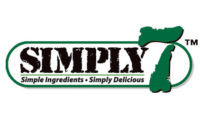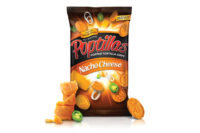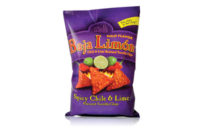Simple ingredients, simply tasty and simply crispy are some of the reasons why business is booming at Simply 7 Snacks, LLC, Houston. President Rashim Oberoi says the company tripled its business last year with the “better-for-you,” gluten-free chips, part of a growing number of such clean-label snacks appearing in the marketplace. Simply 7 exceeded its sales projections in 2011 and 2012, and expects to do the same this year.
“We grew 350% in 2012 and expect to see similar growth in 2013,” he says. “How did we do it? At the end of 2012, we got a very large supermarket chain customer, and we gradually won over several regional supermarket chains that have played significant parts in our business.”
For this and many other reasons, Snack Food & Wholesale Bakery named Simply 7 Snacks our 2013 Snack Manufacturer of the Year.
Crunch time
The line of chips comes in three base flavors of Hummus, Pomegranate and Lentil, in 12 different, savory flavors such as Sea Salt, Bruschetta, Black Pepper, Creamy Dill, Tomato Basil, White Cheddar and Lentil Jalapeno. Containing 58% of the antioxidants found in pomegranate juice, the Pomegranate chips are the latest introduction, hitting store shelves in October 2012. Also new are Lentil Jalapeno, Hummus Roasted Red Pepper chips and a new, seasonal-only introduction, Dark Chocolate Pomegranate chips.
With top sellers being Sea Salt Hummus and Sea Salt Lentil, the chips also have no trans-fat, artificial colors or flavors, preservatives or Genetically Modified Organisms (GMO), are vegan and vegetarian and have 40% less fat than conventional potato chips. As Oberoi says, “We want to build products unique enough to stand out in your grocery store.” So far, his statement seems to be spot-on.
The Oberoi family, with Oberoi as president of Simply 7 Snacks, has been in the food industry for generations. “We’ve been in the food business since my grandfather started it in 1952,” he says. Oberoi, along with the rest of the second generation of family, provided the inspiration for Simply 7 Snacks. The extruded chips, curls and sticks drew inspiration from all corners of the globe for their unique flavors.
The company’s manufacturing division, Dishaka, located at the same Houston facility, has been making and copacking salty snacks for regional and national grocery chains and third-party brands since 1991. Simply 7 Snacks began in 2011 as a fresh, better-for-you approach to business.
“We came to the U.S. from the Middle East in the early ’90s, and started Dishaka,” Oberoi recalls. “My dad also started up with us here and imported bulk rice, which was our original product. The family business is pretty global.”
The family then looked at the portfolios of snack manufacturers and found that most were making products that are either potato- or tortilla-chip based. “Extruded snacks were mostly consumed outside of the U.S.,” he explains. “We became interested in bringing them here. We applied extrusion technology to snacks made of lentils, hummus and now pomegranates, so that consumers would get a crunchy product that melts in their mouth, which a lot of people really like. Instead of competing with potato chip manufacturers, we deliver a different type of base material as a snack that’s ‘better-for- you’ and adds different kinds of flavors.”
Keeping things simple
For any new snack item to gain ground today, Oberoi points out that it not only has to taste good, but has to be good for you. “We admit that ‘healthy and delicious’ isn’t revolutionary,” adds Paul Albrecht, vice president. “But at Simply 7 Snacks, we strive to go a step further. We want to provide a one-of-a-kind snacking experience based on unique ingredients in a form never seen before. Lentils aren’t just for soups and salads. Hummus doesn’t have to be just a dip. Imagine the first guy who thought to turn a potato into a potato chip…that’s us, but with different [raw] ingredients.” He adds that Simply 7 Snacks continues to work tirelessly to ensure that its snacks taste authentic, are healthy and come in all kinds of shapes, quantities and flavors.
As the name implies, simplicity is the company’s mantra for the Simply 7 brand, Albrecht emphasizes. In fact, the brand and company name, Simply 7, is based on seven basic criteria: 1) The products must include no trans-fat, 2) have no artificial flavors or colors, 3) have no preservatives, 4) be gluten-free, 5) be made from all-natural recipes, 6) contain simple, “easy-to-pronounce” ingredients that consumers understand and recognize and 7) be simply delicious.
The snack line is available across the country in most areas. “There was a lot of thought put into our corporate plan and facility,” Oberoi adds. “Extruded snacks are our core competency. The items we copack are distributed across the country as store brands for major health-food supermarkets, conventional supermarkets, private-label manufacturers, other retailers and some hotels, so we make a lot of products for regional and national brands.”
“There were a lot of [snack] companies calling themselves simple, but their ingredients weren’t simple,” Oberoi says. “We wanted to add something to the simple concept. Our ingredients really are simple, healthy and taste good. We don’t want to use any ingredients you can’t pronounce. Our staff is pretty athletic, and we have healthy lifestyles, so we want to maintain those core values. Simply 7 became an extension of that.”
All of the Simply 7 snack products are also certified as nonGMO and kosher. The company discovered that snacks made from unique ingredients are a big trend today, which follows the larger trend of functional foods. People are eating healthier and spending more to do so. Simply 7 Snacks wants its audience to understand what they are eating and feel safe doing it, Oberoi points out, adding “ingredients consumers know and trust are key.”
As an added bonus, extruded snacks also don’t absorb as much oil as traditional salty snacks can, so they intrinsically have less fat. “The moisture level is much lower because the products are extruded, which exerts pressure on the product as it goes through a die and a partial cooking process,” he says.
Packaging plus
The line of snack chips is available in bag sizes from 1- to 15-oz. The metalized polypropylene film bags have a natural, down-to-earth look, with a brown-paper-bag graphic treatment for the background, hand-rendered line art drawings and a clean, uncluttered product presentation. But structurally, the packages are high-tech.
The bagstock is made of a very thick film gauge to help ensure the snacks’ six-month shelf life, notes Oberoi. “That’s very important,” he says. “We don’t skimp on the film. It makes a big difference in shelf life. Not everyone supplies this gauge—it’s pricier. But it’s an added benefit that we provide, as the products have no preservatives.”
Back panels tell the product and company stories, state the seven core standards explaining how and of what the products are made and include a recipe for a dip or accompaniment. “At Simply 7 Snacks, we’re passionate about making great-tasting, wholesome snacks for every lifestyle,” the product copy reads. “We want people to pick up the package and see how simple the product is,” Albrecht adds.
Bags distributed to Canada feature bilingual product copy; those bound for export outside of North America are nitrogen gas-flushed. All total, there are about 30-40 stock-keeping units in the Simply 7 snack line, including single-serve, retail and clubstore sizes. Distribution is national in the U.S. and Canada to major supermarket retailers, natural and specialty markets and foodservice customers as well as online. The line is also exported to parts of Mexico and the Philippines.
The company owes much of its success to being on top of or ahead of the healthy-for-you trends. The Simply 7 products were in the clean-label category from the start and meet better-for-you objectives of the brand’s target audience. They also fit into movements such as gluten-free. “We try to follow the ‘Whole Foods model,’” says Albrecht. “The product message of simplicity and its market positioning give us our edge over competitors. The fact that we also own our own manufacturing arm is by itself probably our biggest asset.”
Indeed, Simply 7 Snacks is equipped with two single-screw extrusion lines that merge into a packaging room, and is about to add a third, custom extrusion line to keep pace with exploding market demand for the Simply 7 products. “The new production line will include similar equipment to what we have, though we’re still not completely fully automated,” says Oberoi. “While we automatically stretch wrap our loads, we don’t yet have automatic palletizing here, but would like to upgrade soon. It’s a huge piece of the whole operation, but is pretty expensive, so must work really well.”
Beyond the snack aisle
Audited annually by the American Institute of Baking (with a Superior rating) and certified since 2007 with the British Retail Consortium (BRC), Simply 7 Snacks pays great attention to food safety.
“Food safety has been a huge program for us,” says Oberoi. “We haven’t been affected by the recent changes in food safety legislation because we didn’t start running product until we were BRC-certified, which is a Global Food Safety Initiative (GFSI) certification. That was a huge achievement that we continue to improve upon. It took a lot of effort and training, but food safety is critical to the manufacturing process and just makes sense.”
What’s next? The company expects to add more snack flavors and may develop a product outside of the snack aisle. “We want to ask consumers what they’re interested in buying and will go from there,” Oberoi says. “Once we get the right machines, we may start making foods in other categories. While it may not be traditional, the next concept will also be natural, healthy and different.”
Now in its third year with its own brand, Simply 7 Snacks is still a young company, but has the confidence it needs to expand further, Albrecht says. “A lot of our growth comes from new accounts. The U.S. is a big marketplace for us, so we have a lot of opportunities we haven’t tapped yet. Consumers are recognizing our brand, and we’re receiving good feedback through increased same-store sales, comments on Facebook and buyers we work with. We treat the relationships we’ve developed as partnerships. We want to be around for 50 years, not five years.”
Adds Oberoi, “We feel that we’ve targeted the right consumer from the beginning. We feel we made the right decisions about the stores we’re in.”
He finds that the products really speak for themselves. “We get a lot of ‘yes’ and ‘probably’ answers when we meet with potential customers instead ‘nos.’ One of the country’s large supermarket chains called us and took on our products immediately—in 1,400 stores. We were shocked.”
Oberoi is emphatic about his trusted staff. “We really have to trust our people, too. If you trust people, it goes a long way. But it’s hard to find the right people who have the right talent. If we find them, we try to do as much as possible to keep them. I don’t think a lot of companies realize this. Everyone here has been behind us—that’s what I’m proud of.”
While their road to success hasn’t all been “simple,” both Oberoi and Albrecht indicate that they’re pleased with the way things are going. “We’re doing something we believe in,” says Albrecht. “At the end of the day, we’re providing a product that hopefully is improving the lives or health choices consumers have when searching for a healthier snack option.”












